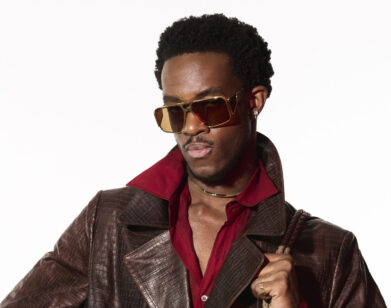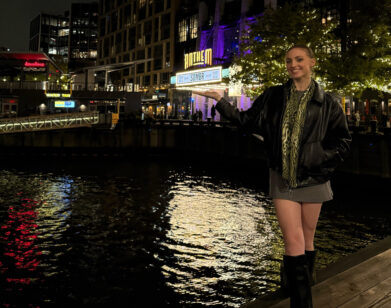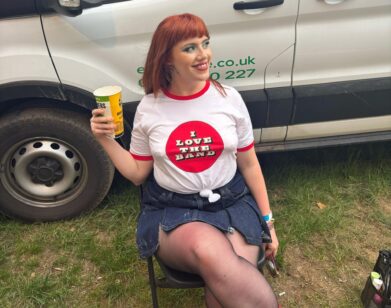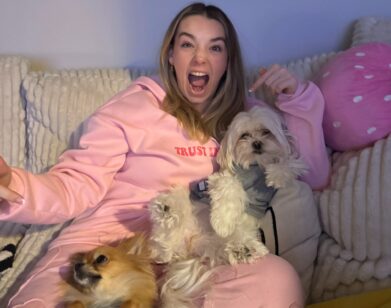extremely online
Caroline Calloway Gets Drunk with Madelaine Turner, the Wes Anderson of TikTok
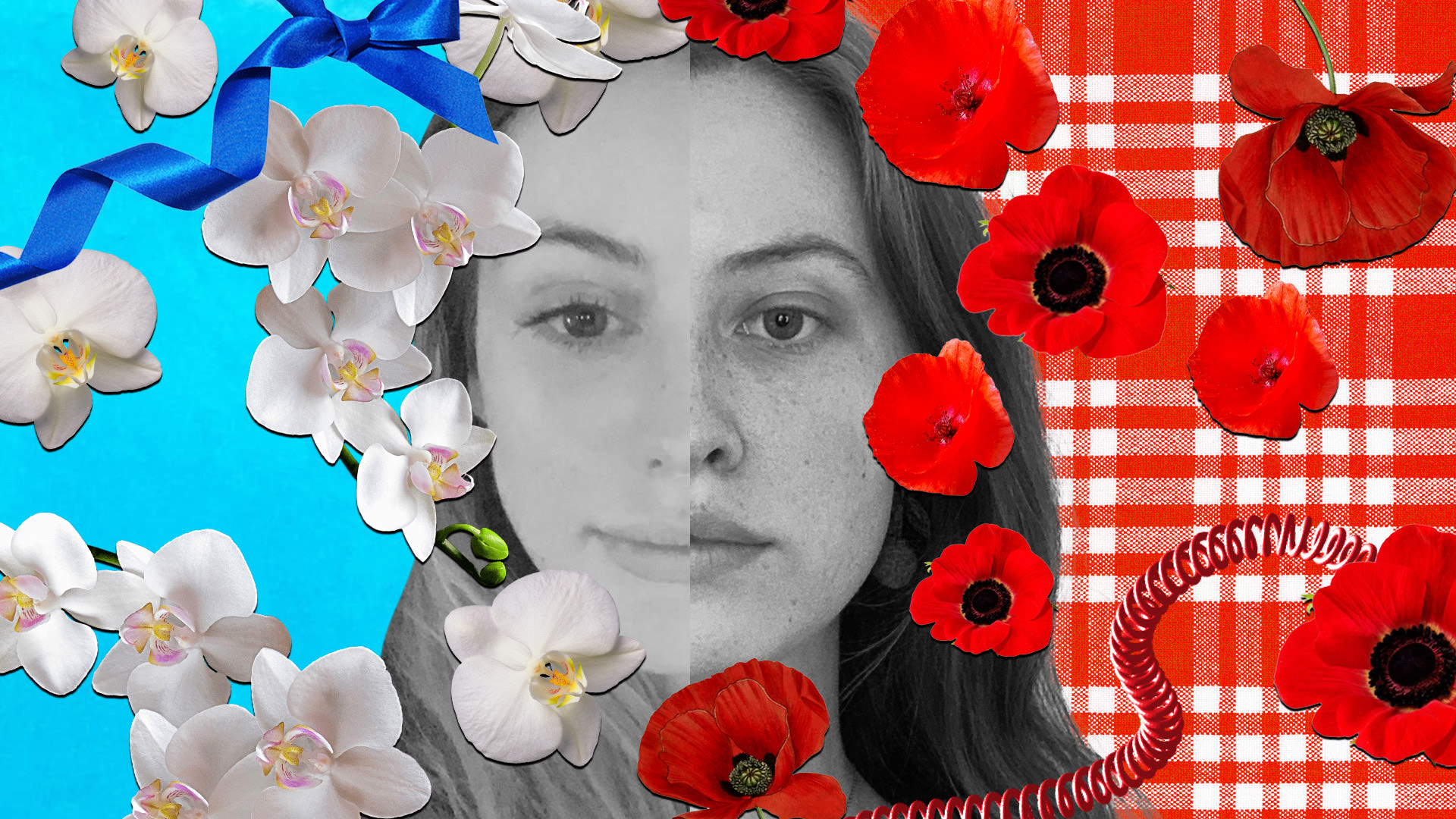
Art by Caroline Calloway.
The other week I got so drunk when I was being interviewed at the Waverly Inn that I said George Orwell was American. Instead of cleaning up my act, I decided it would be easier to just double down and make black-out interviews my brand going forward. So as my Skype call with Madelaine Turner bleep-blooped, I knocked back five vodka shots in a row.
CAROLINE CALLOWAY: Okay, let’s dive into this. What drugs do you like to use and what drugs would you never touch?
MADELAINE TURNER: I’m a big fat stoner. I love weed; it’s definitely my soulmate. I’ve done E a couple times and every time the come down is so bad that I can’t do it for years. I have to be in a really good place in order to do Molly; otherwise it’s just not gonna happen. I’ve never done shrooms but I’m scheduling a camping trip where it’s gonna happen, and I’ll probably never do heroin, although I’m sure it’s a blast.
CALLOWAY: You shouldn’t. Have you done acid?
TURNER: No, I really want to, though. I grew up as a very good Christian girl so I did not start experimenting with drugs until i was in my early-to-mid-20s.
CALLOWAY: Okay well, that’s gonna be confusing for a lot of our audience because you’re literally 15 and that’s why you’re ahead of all the TikTok trends.
TURNER: I’m actually 15-and-a-half.
CALLOWAY: I think a lot of fans of Wes Anderson see his color sensibilities as being right in line with psychedelics, and you are such a fruitful, exploratory, imaginative disciple of Wes Anderson.
TURNER: I feel like he stands alone in what he does. I mean, Tarantino has a good hold on his own visuals, but Wes Anderson has got it locked down.
CALLOWAY: I don’t think anyone is denying the fact that you are inheriting Wes Anderson’s mantle. I think that you are the next Wes Anderson.
TURNER: Well, that’s the reason my manager wanted to sign me. He was like, ‘Oh, I’ve been looking for the next Wes Anderson and then I saw you and was like, ‘there ya go.’
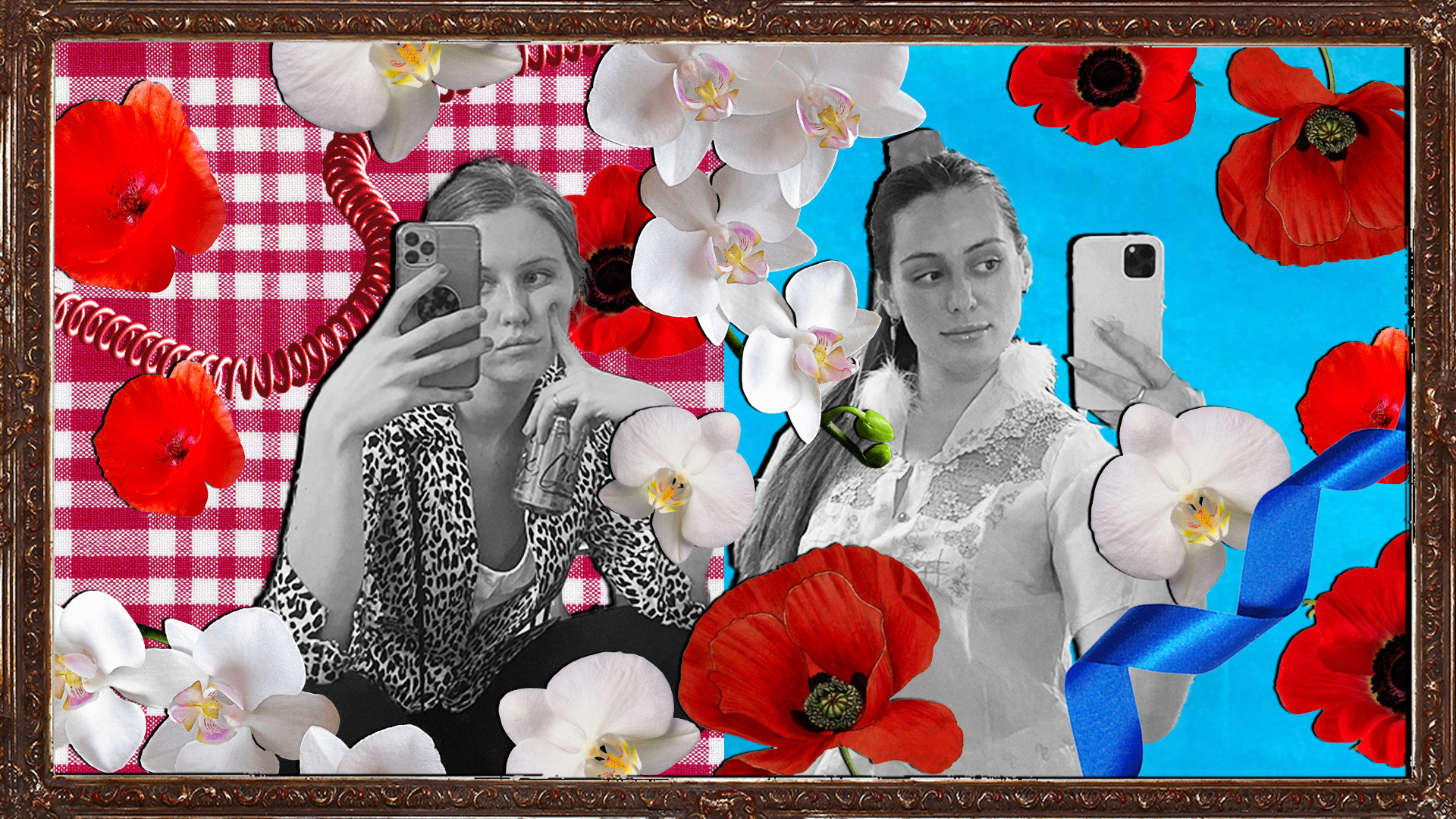
CALLOWAY: Because you are.
TURNER: I’m impressed with everything he does. I would like to bring some more depth to female characters, but I think there is a clear, juvenile approach he takes, like a kid playing pretend with his characters. That resonates with me. My style is very juvenile. I actually found out very recently that he saw the Wes Anderson video I made.
CALLOWAY: I’m stunned out of my mind.
TURNER: I love my team at UTA and a member of my team told me he saw it. Hopefully at some point I’ll meet him, but we also occupy the same space in terms of visual integrity.
CALLOWAY: You know what? I’m just realizing that I don’t know what Wes Anderson looks like.
TURNER: He looks like a Weasley brother—Bill Weasley exactly. Very thin, sort of long hair, wears lots of tweed. He’s exactly what you think he’d look like. Bill Weasley is the one who ran off to America and just got rid of his magical life to make movies for quirky little girls.
CALLOWAY: What about him are your biggest inspirations? Everyone sits on the shoulders of those who came before us, but I see you as your own thing, and employing me someday.
TURNER: I’ll come visit you in New York. We will have a whirlwind adventure together and that will be the basis for my next screenplay. My whole journey into this has been pretty ass backwards. It’s insane that it happened and is happening now because when I was in high school and thinking about going to college, film was not even on my radar. It was something I deeply loved and dreamed about, but with my finances and academic prowess, which were absolute shit, it was just not gonna happen. I thought I had to kill this dream, and not want this dream, or else I’m gonna be so miserable, which I was for like 10 years because I didn’t shove it in a box far enough away from me. When quarantine happened, that’s when i first started making real narrative content. It’s only been about a year.
CALLOWAY: That fucking blows my mind. You’re now getting Glossier campaigns, and there’s been people at this for ten years who are not booking these same jobs.
TURNER: It feels really insane. It’s very overwhelming, walking that tenuous balance between ‘this is a great opportunity’ while also squelching down that little ego minion in the corner of my brain saying “You’re a superstar” and then being like, “Bitch, calm down, do the work.” It borders on the “no one understands me” mindset, which is not true. I just did the New York Times crossword puzzle, and it grounds me.
CALLOWAY: I’m not the first person to compare you to Wes Anderson and certainly not the last, but what I’m really excited about is ways that you will transcend him. Even if we talked for hours about how your work pays homage to him, we wouldn’t even need to—anyone who watches TikTok, they’ll get it—the visual color stories, the cinematography, it’s all there. But I see something new in your approach. My mimosa is ready—tell me everything about how you will expand on Wes Anderson characters, because this is what Interview Mag needs to hear.
TURNER: As a creator, it’s such a cool thing to even have that question be asked. It feels so big and makes my heart all bubbly just getting to talk about what inspires me and the things I want to create in the future. I feel like, “Are fucking kidding me?! Someone pinch me.” My film education started really young. My mom is a very wonderfully creative woman. She feels deeply and has an incredible vocabulary and instilled that in us. She has a deep love for film and our house has always been filled with books and music, and loves to entertain in beautiful ways. She ended up getting remarried to my stepdad.
CALLOWAY: You have three younger sisters also?
TURNER: I do have a ton of siblings. I wish I were in Little Women. I want to be a Jo, but I’m probably not. I’m like a Meg. I’m totally the older sister who is prim and wants stability and nice things. She was alright.
CALLOWAY: Emma Watson!
TURNER: Yeah, she was alright. To me, she was the weakest link. That’s just my opinion.

CALLOWAY: I’m a mix between Florence [Pugh]’s character [Amy] and Jo, in the same way that I’m a mix between Carrie and Charlotte.
TURNER: I think anyone who can own the fact that they’re an Amy is someone who is very aware of themselves. Anyone who thinks they are a Jo is probably not a Jo. I actually think I’m half Amy, half Meg. There’s this duality in me that’s like, I think I should be responsible and settled down, but also like, “Fuck you, I’m amazing, and let’s party.” Thats me.
CALLOWAY: Okay, enough with the Little Women BuzzFeed quizzes.
TURNER: My childhood, so poor, so destitute, but it was filled with art. My dad, who passed away, and also my step-dad, were well educated men—writers, educators, journalists, very erudite. So if you’re financially destitute, all you really have is culture. So you can acquire cultural knowledge, especially through the internet. The idea of “aesthetic” being a word that a 9-year-old knows blows my mind.
CALLOWAY: If you born in the 90s, and you buy the aesthetic on Depop, you are buying images you remember.
TURNER: Music is also so important to me, and I can be kind of a fucking bitch about it. I try to be a cool chill girl, but I can be an asshole at times.
CALLOWAY: Would you describe yourself that way if you were a man, or are you only saying that because you’re a girl?
TURNER: Honestly, men are assholes about everything, sucks to suck. But I remember hearing a song by Phoenix when I was 14 on the radio and listening to the rock station and desperately waiting for it to come on again. Now I can be in a Starbucks and press a button to have it dialed into my phone, no questions asked. These kids have everything. You don’t have to do so much exposition and storytelling now because everyone has a much larger reference for things. The access of information is so easy.
CALLOWAY: I feel like I’ve heard it all and said it all, and when studying the history of art at Cambridge, it was genuinely interesting to see how the evolution of the discipline has been thrown into such harsh relief, because the whole department was not set up for PowerPoint, but for colored slides. The only people who would ever get to see these images back to back to back were the people who were lucky enough to be in art history classes. But now we get to see these images everyday.
TURNER: You can find a specific YouTuber for anything you need to know, which is why I think I’ve gotten to learn as much as I have within the year without going to school because there is so much information available. Anytime you need a tutorial for anything, you just need to look up a few words and you will figure it out on your own.
CALLOWAY: You’ve taught yourself everything about how to edit videos?!
TURNER: Yes. I didn’t go to college at all. I went to community college for two weeks. I was such a bad student and moved out when I was 18 which was a couple months before my graduation. My mom had to beg me to come back for graduation. I had a full-time job as a hostess of a restaurant, and was ditching classes because I wanted money. That was my big thing. I wanted money and I still do.
CALLOWAY: As you should, because money is a resource.
TURNER: Money is an excellent resource.
CALLOWAY: It sounds like you were born into a low-resource situation.
TURNER: Definitely. I will say that now that I’m in a situation where I can thrive. I sort of had a hard time acclimating to any other profession.
CALLOWAY: I have three assistants and that’s the only way I can function in the corporate world.
TURNER: I have retired my husband; he’s not allowed to go to work because I cannot function without him being my assistant. He was working in print production and got a massive pay cut and I started getting brand deals. It got to the point where it wasn’t an easy street, but it became more feasible to be like, ‘Please quit your job.’ I don’t feel like I could be doing what I’m doing without him. He’s like my rock.
CALLOWAY: I don’t think there are enough good examples of stay-at-home husbands.
TURNER: He takes care of me. Hopefully in the future when we have kids, he will be the best stay-at-home dad in the universe. I’m stoked to be a pioneer. Last week, I sat down with him and said you’re not allowed to get another job and that I will do whatever I can do so that you can stay home. You can come join our commune in Long Beach. We watch a lot of British game shows and get high. That’s pretty much all we do.
CALLOWAY: Tell me more about what you love about Wes.
TURNER: The symmetry, the clear intention. Something that is missing from movies nowadays is the textured, sort of lived-in feel. There’s nothing glossy about his films, there’s nothing fake about them. They’re hyperreal. His films feel like a beautiful little dollhouse. I think that’s something I’ve always been so drawn to, and I think that’s why he likes working with claymation—because he has total control. He wants absolute control, but a whimsical, sort of imaginative control, like a kid who doesn’t want to share his toys. My favorite film by him is a tossup between The Royal Tenenbaums and Moonrise Kingdom, because Royal Tenenbaums is a better story but Moonrise Kingdom is visually gorgeous. Royal Tenenbaums was also the first film I saw, and every time I see one of his films cause I’m like “Fuck you, you thought of it first” and I have this moment of “Oh, this is how I see things.” I didn’t like that he got what I got, and that he got there first.
CALLOWAY: I think that feeling will go away because your films that are on TikTok are amazing. I used to look at these downtown blondes in terms of their culture and chaos, but the second I got my own thing, I started thinking, “Maybe they wish they did it like I did.” I think that the more you do it, the more you will be excited about what you make.
TURNER: I hope people are into having more female characters with stronger narratives. I think that sometimes when female characters are done well, they’re not received as well. It’s just the more the male presentation of the character that gets lauded.
CALLOWAY: What is your dream project you want to get financed?
TURNER: I have so many things that I want. I think my dream project is this vision that’s not explicit to one story but a place between reality and fantasy that is hard to describe. There’s this specific otherworldliness that I want my catalogue to represent, and I want to be known for that tone and those colors. In the same way that Wes Anderson is, I will always be visually charged. My big ideas come from single images that I see in my day-to-day. I can imagine a whole movie then work backwards from that. I would love for people to feel something or get something out of what I’m making, but my bigger goal always is to make sure people have a good time, laugh, and to feel delighted. I’m an entertainer and I want to entertain. You’re going to have a great time. You’re going to have a piece of the feminine mystique to keep with you.
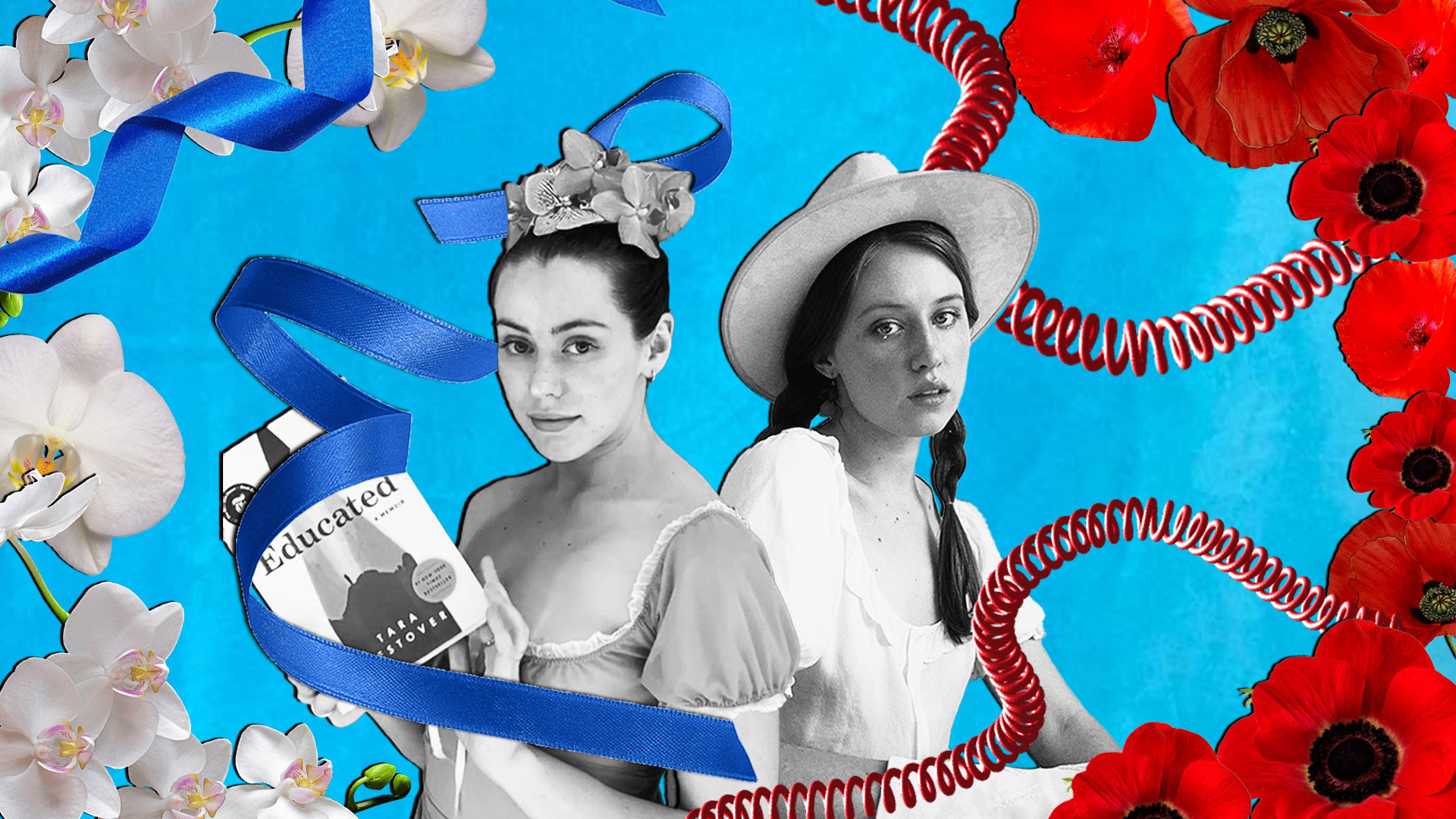
CALLOWAY: Where do you plan to expand on Wes’s vision?
TURNER: What I would like to do in my career is to bring a level of depth and a level of femininity that is lacking in this type of film. I think girlhood is something that has yet to be explored in a lot of lovely and nuanced ways. I would like to take how Wes approaches childhood and give it that sort of lovely, flowery, heartbreaking, and fun energy that is at the center of girlhood. Trying to utilize what we know now within this larger cultural lexicon about psychology and things like codependency and what you’d talk to about your therapist, and integrating that into a fantastical, quirky, odd world. I want to create characters and put them in beautiful and whimsical places.
CALLOWAY: Our culture really sees girls as being at the receiving end of emotional abuse, which does a disservice to boys.
TURNER: I think it hurts boys and girls because girls don’t get the privilege of learning how much their actions impact other people. As a girl, you often feel that you’re always on the receiving end of everything, so you don’t even understand how much of a nightmare you’re capable of being, because no one has ever told you that you have that type of power. Then you’re caught in this loop of awful behavior with no sort of ability to regulate it, which doesn’t get you to the same place it would if you were a man.
CALLOWAY: Being in a codependent relationship was one of the most difficult experiences I’ve ever had and I’ve never seen it beautified and cinematized into a way that was powerful to me—not that we should metabolize emotional abuse into something that is digestible. I just think it would be easier for me to understand my own experiences to see if they were onscreen. And I think it’d be easier to see them onscreen if more female directors were to apply the Wes Anderson sensibility to female experiences.
TURNER: I would’ve sat through anything if it were a bit prettier or more detailed. The thing that I notice myself being drawn to when creating my short films is definitely the prop work and the attention to detail. The confidence in his own aesthetic and his own vision is unmatchable. Wes grew up in the middle class in the middle of Texas, but he was always immersed in his own mind and not bogged down by what anyone would think of him. I’m excited to get the opportunity to show people my brain in the same way that Wes Anderson is able to show the inside of his brain. I think you will like it, and enjoy the delight. You just might!


